Alright, this blog has been formulating for over a year now. Drafts, rants on Facebook, in my classes and certainly in my never ending brainstorming.
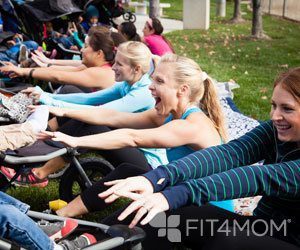
Image taken from: Stroller Strides Chicago, Neighborhood Parents Network
Before you send me hate emails and defensive comments, read the entire blog please.
Mommy Bootcamps, I like what you do. You’ve created a realm for mothers to come together, in a non-intimidating environment as a way to connect and workout. It is great and essential to have this in local communities everywhere. I genuinely support this effort. You are not my competition. In fact, it would be great to have more local fitness programs and coaches I felt confident referring my clients to when they complete my programs/consults and need something that better accommodates their schedule or interest.
Here’s where I’m seeing some upsetting trends with these kinds of programs. I drive by, and I see these mamas, running, crunching, planking, doing plyos, standing and moving with severe posterior pelvic tilting…with their tiny baby at their side or in their arms. Yes, I’ve parked and observed. The pictures posted on the Facebook pages confirms it as well- running down hill, holding planks, doing bicycle sit ups, etc. But this isn’t what what disturbs me the most.
I meet and coach a lot of women in my community, many of them come to me after their second baby and upon completion of a few sessions, they’re both elated and devastated. I’m CONTINUALLY met with this same feedback: “I went to [mommy fitness program] after I was cleared for exercise after having my first child and the main focus was ab work and running. No one mentioned incontinence, posture, breathing or Diastasis Recti. I assumed my weak core, pelvic/hip/back pain and leaking with a sneeze or during running was normal or at least, not a big deal. I’m sure I made it worse by doing all that. Why is this (what I coach) not being talked about?!”
Look, I know there’s more to these program than abs and running. But, this being a consistent foundation of fitness within a training program designed for moms is a problem for this demographic’s exercise needs/abilities/readiness.
I could easily pick apart high intensity interval training, Beach Body, Yoga, Pilates, Marathon training, etc for the postpartum woman, all programs have their faults, BUT…theses programs/activities are not specifically marketed toward mothers, so although it would be great if all coaches knew the basics about coaching postpartum women, they just don’t (typically), because they don’t have to!
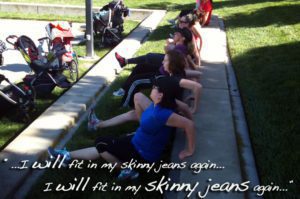
Image take from: The Spoiled Mama Blog
Mommy Bootcamps, however, it’s all mothers! And new mothers- just cleared for exercise mothers- healing mothers- mothers that are NOT ready for the exercises they’re being prescribed. Even the fittest of women, the ones with the most perfect pregnancy and delivery and athletic history, need to begin postpartum fitness with corrective exercise, rehab and proper function of their core and pelvic floor. Once that’s dialed in, then they can work on strength and impact. If a strategy is in place and they are able to progress super fast, great- that’s my goal as a coach! But the women I see, are clueless as to what it means to move and exercise with your core and pelvic floor in mind. Far too many women create more dysfunction than they resolve by resuming exercise “as normal.” Postpartum is an essential time for awareness of the importance of healing and rebuilding a foundation of function and strength.
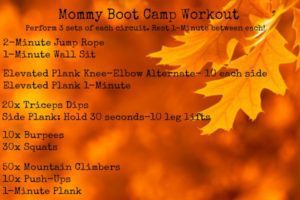
Image taken from: She Rocks Fitness
Here’s another disclaimer: I have NOT read through the certification required to be an affiliate or coach for these programs. And I’m not willing to buy the certification just for writing this damn blog. If you would like to share, pass it on! I am, however, totally disturbed that there’s a certification and program titled “Body Back,” by one of the main mommy bootcamp programs. Fitness professionals should have far better messaging than this, nevertheless have a certification with that title. This kind of marketing is not part of the solution, it’s one of the biggest problems in the fitness industry. Maybe these certifications have material and research that mentions postpartum exercise, coaching cues, progressions, breathing and pelvic floor coordination, Diastasis Recti, SUI, when to refer to a Pelvic Floor Physical Therapist, etc…but from what I have observed and been told countless times, THIS IS NOT BEING IMPLEMENTED OR EVEN MENTIONED. Of all exercise programs out there, a new mom based fitness program should be doing a better job of educating their coaches and maintaining quality control for the population they’re coaching.
This is not picking on the coaches, it isn’t their fault. Even if they try to educate themselves via Google, the misinformation is abundant. You see, even college educated trainers do not have knowledge of pre and postnatal fitness. I can personally attest to this! And, it’s important to note, that just because a mom has a “hot body” or lost all her baby weight, does not, in any single freakin’ way, mean she is qualified to be coaching other women, especially during this chapter of fitness.
My coaching career forced me in the direction of working with pregnant and postpartum athletes (all women are athletes) because I simply could not believe that lack of resources available for this population and I could’t turn my back or shut my mouth. I also know what it’s like to assume and “feel fine,” postpartum only to have that backfire. New mamas are the most vulnerable population for extremes and poor exercise choices because they are desperate to get their “body back.” Kicking a new mom’s ass through exercise will never be the solution, it only contributes to the problem for these women. Sometimes, a problem may not always present itself until later on! The exercises and movements you do, what you don’t do and how you do it during pregnancy and postpartum matters, a whole hell of a lot.
Women trust their coaches and will do as they are told. They will crunch hundreds of times, they will do a running challenge at 6 weeks postpartum, deplete themselves by following BS meal plans and will never think to ask questions about their core and pelvic health because of stigma, lack of awareness, don’t think they need to or accept dysfunctions as a normal part of motherhood. No new mother or woman should be training in this manner. It’s not healthy or sustainable.
Mommy fitness programs, you can do better. You can challenge your coaches to help women move more and move better with a proper strategy (breath and pelvic floor coordination, alignment) and provide appropriate referrals , movements and progressions.
If you’re a local coach, I’d be happy to mentor you to help guide your programming and resources. We can do better for the women we get to impact.
Mamas, if anything here has resonated with you, I encourage you to join my postpartum fitness program, regardless of how postpartum you are. If you can’t make those days/times or don’t live locally, I have a variety of remote coaching, consults and personal training services available.
Want to follow other appropriate postpartum fitness advice? Check out the resources offered by my wonderful colleagues!
Jennifer Campbell of Mama Lion Strong and Healthy Habits Happy Mom’s
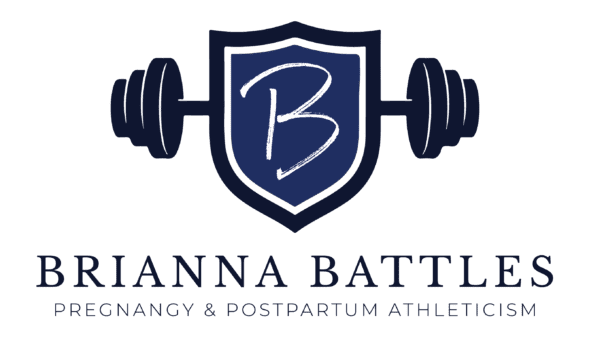
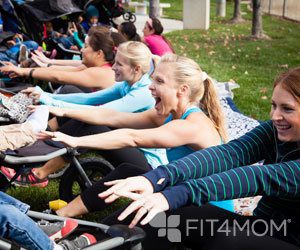
Yes! This! Ack!!! I know exactly what you are talking about because I was part of Fit4mom. Not as a coach (though I was close to signing up to be “certified”) but as a participant 6 months after my first baby and unplanned c section. Stroller Strides and a few body back free classes. I went along because I didn’t know better. I asked about diastasis recti and was “checked” by my stroller strides coach but but was told “you’re fine. it’s just fat”. Well it wasn’t “just fat”. I trusted her and didn’t look much farther into it. I went on to workout with them through my next pregnancy up to my 41st week (my boys are 42 weekers). I took a break from Stroller Strides and had my baby (I attempted a VBAC and was still unaware of how core strength, alignment, improper pushing and yet another c section would affect my core) I was experiencing extreme pain. I couldn’t hold my baby without pain or sit or stand. It was ridiculous. Thankfully I live close to Camas, WA where The Tummy Team’s office is and I booked myself a slot to be seen. Turns out I had a DEEP 5-9-5 Separation in between my abs. I was shocked and relieved. I finally knew what was wrong and got the tools on how to heal my core. Once I was educated on how my core came to be so broken and what to avoid I never went back to it. I tried asking the instructors about their training and knowledge and even shared updated info through links to sites with the correct information on postpartum fitness and core/pelvic floor health but they wouldn’t listen. It’s sad really because the accountability and community of mamas and friendships were extremely valuable but I couldn’t justify paying for a service I’d have to modify everything on my own for and watch other mamas be told misinformation and wreck their cores.
That is why I am so thankful for women like you and sites like this that encourage mamas to take the time to heal themselves and get educated on these issues that have always been around but are finally being talked about and solutions/alternatives are being provided.
Now, pregnant with my third, I am better prepared having already completed Core rehab and a cesarean core prep course. And I am glad I have options for fitness once I am healed and ready to ease back into it.
Fantastic. Thanks for this and I will be sharing this a LOT. This is exactly why we have created our Bellies Inc. certification becuase the lack of knowledge and education (even in the most current pre/postnatal certifications) don’t even mention the words “pelvic floor”, never mind seeing a PFPT.
Me and my business partners have been accused of being “anti” this and anti that when the only thing we are really anti – is mis information and lack of education while marketing yourself as an expert on something you have no idea about.
Thanks again for this great post and let the haters hate if they have to. It’s only because you have exposed them. 🙂
I have dedicated most of my life to teaching pre/postnatal fitness and even teach bootcamp (gasp). I take my job very seriously and evolve my classes as my knowledge evolves. I have always discussed core/pelvic floor and am always offering modifications that suit each participant (not always easy in a large group class). It upsets me when i see these bootcamp classes being painted with the same brush, being viewed as bad. I work very hard at my job, I educate trainers at Baby & Me Fitness and we support womem through a very exciting (and challenging time), our bootcamps are specifically designed for new moms and are vastly different than bootcamps for a regular population. Just had to share my side:)
I LOVED this post, thank you SO much.
I’m a pregnancy and post-natal trainer/instructor (MomTrainer.com) and I can’t tell you how many times I’ve cringed watching these “bootcamps” while training my clients in parks. It’s extremely frustrating having to explain how certain companies promote themselves as “for moms” while at the same time encouraging pregnant and/or postpartum women to perform extremely dangerous exercises without explanation or examination first.
One thing I think we can all agree on is that “Bootcamp”, “HIIT”, “Body back”, etc, programs are an unfortunate marketing response to our client’s fears. Good “copy” simply reflects the dialogue of the consumer. The pressure new mom’s feel to “bounce back” is another conversation… but I think it also encourages a lazy and/or uneducated instructor to promote their classes/ programs/ products outside of their scope of practice.
Not all of our clients will recognize the importance of prenatal/ postnatal core, pelvic floor, and breathing work… but it’s our job as instructors and trainers to keep our programs engaging and exciting while still getting our clients the results they hire us for. The more we can spread the word… literally…. very few of my postpartum clients have ever heard the term “diastasis recti” before hiring me… the more we can encourage women to engage in appropriately programmed fitness classes and/or PT.
After my 3rd pregnancy and birth, I’m finally learning about my deep core muscles and how to heal my diastasis. I do agree with many of your thoughts, but I find many other things in these classes in terms of keeping me sane as a mother (as I also have found emotional support through these classes). There is definitely room for improvement in the area of postpartum health, though I feel like the place where it’s most important and not happening is immediately post-birth or at least at the 6 week check-up. My midwife did recommend physical therapy, but this was my first time after 3 kids of that happening, and I spent 6 months with a physical therapist that was not helping me. I finally had to learn a lot on my own to realize I needed to find someone new. I am finally on the right track. I do continue Stroller Strides, but I modify as needed (only low impact moves and walking, no planks, no push-ups, etc.). I feel like I’ve found the right balance with my recovery, but I can see how many new mothers might try to do much too fast. Thanks for doing what you are doing!
Thanks so much for this post! I also feel really strongly about this issue. After making the mistake of doing too much, too soon due to lack of information, I decided to get certified in pre/postnatal fitness in order to hold Buggy Bootcamp classes locally. Although the head of the franchise gave me lesson plans with completely inappropriate exercises for the postnatal population, the knowledge I gained from the Baby & Me fitness instructor certification, told me to do otherwise. I have always advocated low-impact moves and restorative core & pelvic floor work. Unfortunately, the classes haven’t been too successful to-date. So, it really angered me when I saw that another local personal trainer who recently became a mum and who has no specialist pre/post-natal certification has started mum and baby fitness classes in association with an established family center and is doing really well. Makes me wonder how I can market my classes as the SAFE postnatal exercise solution.
Thank you for bringing to light the ever important need to take care of our pregnant and new moms in fitness and life. At FIT4MOM, we are consumed with the health and wellness for moms at every stage of motherhood. While you may have had observations of fitness classes not serving the physiological needs of new moms, our instructors are certified trainers and are aptly prepared to train them with this time in life at the forefront of their education. That being said, anyone in the field of mom-fitness needs to periodically pause to remember, and then apply, this thinking and application of this knowledge to these amazing moms who come to us. Thanks for the concern and bringing this into the light. Our hope is that every one’s experience is elevated when we all are aware.
I’m a FIT4MOM franchisee and have been a part of the program for over 6 years. We take our jobs very seriously and are fortunate to be trained by the leading pre and postnatal fitness experts. I check all of our moms who are concerned about diastasis recti and always refer them to a PT if they are out of the range of normal. My franchise actually works with a local PT office where we host our prenatal classes, FIT4BABY, who back up everything we do.
That’s great that your community does this! It’s not the same everywhere, unfortunately. Keep up the great work and advocacy!
I’d encourage you to try a class out where you are so you can see first hand how FIT4MOM is different from other “Bootcamps”.
I am highly involved in the fitness, in particular, pregnancy and postpartum fitness community. I know a lot of FIT4MOM instructors, and have many clients that have taken these classes. I have observed many classes and even interviewed instructors- have even mentored some. It’s great that you are doing positive things for them women you work with, but not all programs, FIT4MOM included, is up to date with postpartum fitness recommendations and rehabilitative progression. In many communities around the US, women are given poor info, and it’s even marketed that way on the website. Thanks for your comments and keep up the great work with the women you coach!
Pingback: When it all comes together: Diastasis Recti, HEALED – Everyday Battles